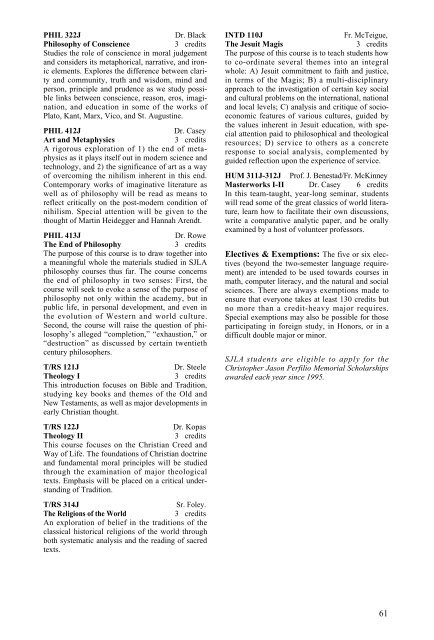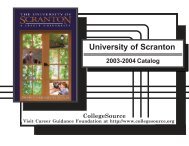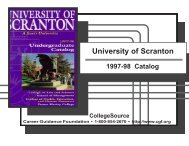Create successful ePaper yourself
Turn your PDF publications into a flip-book with our unique Google optimized e-Paper software.
PHIL 322J Dr. Black<br />
Philosophy <strong>of</strong> Conscience 3 credits<br />
Studies the role <strong>of</strong> conscience in moral judgement<br />
and considers its metaphorical, narrative, and ironic<br />
elements. Explores the difference between clarity<br />
and community, truth and wisdom, mind and<br />
person, principle and prudence as we study possible<br />
links between conscience, reason, eros, imagination,<br />
and education in some <strong>of</strong> the works <strong>of</strong><br />
Plato, Kant, Marx, Vico, and St. Augustine.<br />
PHIL 412J Dr. Casey<br />
Art and Metaphysics 3 credits<br />
A rigorous exploration <strong>of</strong> 1) the end <strong>of</strong> metaphysics<br />
as it plays itself out in modern science and<br />
technology, and 2) the significance <strong>of</strong> art as a way<br />
<strong>of</strong> overcoming the nihilism inherent in this end.<br />
Contemporary works <strong>of</strong> imaginative literature as<br />
well as <strong>of</strong> philosophy will be read as means to<br />
reflect critically on the post-modern condition <strong>of</strong><br />
nihilism. Special attention will be given to the<br />
thought <strong>of</strong> Martin Heidegger and Hannah Arendt.<br />
PHIL 413J Dr. Rowe<br />
<strong>The</strong> End <strong>of</strong> Philosophy 3 credits<br />
<strong>The</strong> purpose <strong>of</strong> this course is to draw together into<br />
a meaningful whole the materials studied in SJLA<br />
philosophy courses thus far. <strong>The</strong> course concerns<br />
the end <strong>of</strong> philosophy in two senses: First, the<br />
course will seek to evoke a sense <strong>of</strong> the purpose <strong>of</strong><br />
philosophy not only within the academy, but in<br />
public life, in personal development, and even in<br />
the evolution <strong>of</strong> Western and world culture.<br />
Second, the course will raise the question <strong>of</strong> philosophy’s<br />
alleged “completion,” “exhaustion,” or<br />
“destruction” as discussed by certain twentieth<br />
century philosophers.<br />
T/RS 121J Dr. Steele<br />
<strong>The</strong>ology I 3 credits<br />
This introduction focuses on Bible and Tradition,<br />
studying key books and themes <strong>of</strong> the Old and<br />
New Testaments, as well as major developments in<br />
early Christian thought.<br />
T/RS 122J Dr. Kopas<br />
<strong>The</strong>ology II 3 credits<br />
This course focuses on the Christian Creed and<br />
Way <strong>of</strong> Life. <strong>The</strong> foundations <strong>of</strong> Christian doctrine<br />
and fundamental moral principles will be studied<br />
through the examination <strong>of</strong> major theological<br />
texts. Emphasis will be placed on a critical understanding<br />
<strong>of</strong> Tradition.<br />
T/RS 314J Sr. Foley.<br />
<strong>The</strong> Religions <strong>of</strong> the World 3 credits<br />
An exploration <strong>of</strong> belief in the traditions <strong>of</strong> the<br />
classical historical religions <strong>of</strong> the world through<br />
both systematic analysis and the reading <strong>of</strong> sacred<br />
texts.<br />
INTD 110J Fr. McTeigue,<br />
<strong>The</strong> Jesuit Magis 3 credits<br />
<strong>The</strong> purpose <strong>of</strong> this course is to teach students how<br />
to co-ordinate several themes into an integral<br />
whole: A) Jesuit commitment to faith and justice,<br />
in terms <strong>of</strong> the Magis; B) a multi-disciplinary<br />
approach to the investigation <strong>of</strong> certain key social<br />
and cultural problems on the international, national<br />
and local levels; C) analysis and critique <strong>of</strong> socioeconomic<br />
features <strong>of</strong> various cultures, guided by<br />
the values inherent in Jesuit education, with special<br />
attention paid to philosophical and theological<br />
resources; D) service to others as a concrete<br />
response to social analysis, complemented by<br />
guided reflection upon the experience <strong>of</strong> service.<br />
HUM 311J-312J Pr<strong>of</strong>. J. Benestad/Fr. McKinney<br />
Masterworks I-II Dr. Casey 6 credits<br />
In this team-taught, year-long seminar, students<br />
will read some <strong>of</strong> the great classics <strong>of</strong> world literature,<br />
learn how to facilitate their own discussions,<br />
write a comparative analytic paper, and be orally<br />
examined by a host <strong>of</strong> volunteer pr<strong>of</strong>essors.<br />
Electives & Exemptions: <strong>The</strong> five or six electives<br />
(beyond the two-semester language requirement)<br />
are intended to be used towards courses in<br />
math, computer literacy, and the natural and social<br />
sciences. <strong>The</strong>re are always exemptions made to<br />
ensure that everyone takes at least 130 credits but<br />
no more than a credit-heavy major requires.<br />
Special exemptions may also be possible for those<br />
participating in foreign study, in Honors, or in a<br />
difficult double major or minor.<br />
SJLA students are eligible to apply for the<br />
Christopher Jason Perfilio Memorial Scholarships<br />
awarded each year since 1995.<br />
61
















